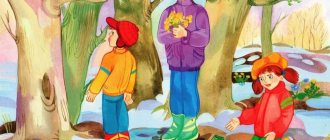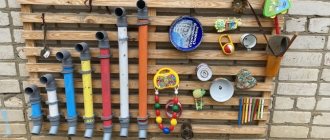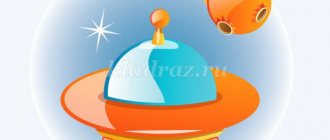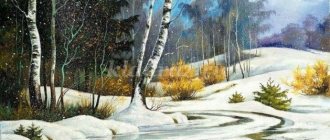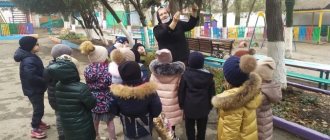Summary of the final lesson for children of the first junior group “Spring walk”
Purpose of the lesson: activation of cognitive and speech activity of children.
Tasks:
- consolidate knowledge about spring;
- consolidate knowledge about color;
- clarify the concepts: one - many, wide - narrow;
- development of interest in game improvisations.
Planned result: has a basic understanding of spring, knows four primary colors; participates with interest in outdoor games and game improvisations.
Materials: wide and narrow path, cubes, hoop, duck with ducklings, bear, flowers (yellow, red, green, blue), hedgehog, basket.
Progress of the lesson
- Children, remember what time of year it is now? (Spring)
- That's right, spring. Why is it warm in spring? (Because the sun is shining)
- Let's sing a song about the sun:
Sunshine, sunshine, shine brighter for us, Flowers will bloom on the lawn. Sunshine, sunshine, shine brighter for us, All the guys will weave wreaths.
- I heard that flowers have already grown in the forest and I want to invite you for a walk in the forest. Can you help me find flowers? (Yes).
- We will decorate our group with them. Let's take a basket for them and go into the forest together.
- Look! What is this? (This is a stream).
- What is it: wide or narrow? (Narrow)
- What should we do with you? How to get over it? (You can jump over it).
- That's right, first I'll jump over, and then you. (jump over)
- And then there’s the river. What is she like? (Wide).
- Can you jump over it? (No).
- And why? (It's wide).
- We will cross it on pebbles. How many are there? (A lot of).
- How should you go across the river? (Carefully)
- And why? (You can get your feet wet).
- What happens if we get our feet wet? (We'll get sick)
- We will cross the river carefully, I will go first, and you will follow me. (Move over)
- What is it? Yes, this is a lake! What is it like? (Round)
- And who is this? (Duck with ducklings)
- How many ducks? (One)
- What about the ducklings? (A lot of).
- What are they doing? (They swim).
- And then someone else hid from us. And he growls at us too. Who is this? (Bear)
- Yes, it's a bear. What did the bear do in winter? (Slept)
- Bear, bear, couch potato, he slept long and deeply.
He slept through the whole winter, and spring came, he woke up and wants to play with us. Shall we play with him? (Yes)
P.I. "Brown bear"
- Now let's say goodbye to the bear. Goodbye, bear. It's time for us to move on.
- Have you forgotten where we are going? (For flowers).
- Where are they? Here is a clearing, and there are flowers on it. There are so many of them. Let's smell them, let's smell them. (Inhale through your nose, exhale through your mouth/ 3-4 times)
- Now let's collect flowers. First we will collect the red ones, and then the yellow, green, and blue ones. Let's put them in the basket.
- How many flowers do we have in the basket? (A lot of)
- Hear, someone is puffing here for a stump. Look, it's a hedgehog.
Like a bear, he slept all winter, and woke up in the spring. Touch it. What is he like? (Barbed)
- What a prickly hedgehog
He looks like a Christmas tree
It has needles like our Christmas tree.
- Let's turn into hedgehogs and curl up into balls:
Here's a hedgehog curled up in a ball because he's cold
The hedgehog's ray touched
The hedgehog stretched once
He smiled, smiled and stretched again.
- These are the wonderful hedgehogs we were! Now let’s turn back into kids and go back to kindergarten.
Let's take our basket of flowers and go: past the lake, across the river, through the stream. So we came to kindergarten.
— Did you enjoy walking through the forest?
— What did you like most?
Andreeva Nadezhda Anatolyevna Teacher, MBDOU kindergarten No. 97, Kamensk-Uralsky, Sverdlovsk region, Russia.
The material is published in the author's edition
Summary of a walk in the second junior group on the topic “Spring is red!”
Form of work:
household labor
Target:
Encourage children to work hard, teach them to maintain order and cleanliness.
Educator:
And now it’s time to work hard, kids!
Children, do you know what needs to be done to keep the site clean?
Children:
get out.
Educator:
Let's together remove sticks and twigs from our area.
let's clean up
Educator:
Guys, we have worked hard, and now let's play a game.
4. ACTIVE GAME
Name:
"Mushrooms"
Target:
Teach children to listen carefully to the teacher, walk in a circle, converge in a circle and disperse. Learn to navigate in space.
Educator:
Children, we will play our favorite game called “Mushrooms”.
So. Our dad will be ..., mom will be ..., and our son will be ....
How mushrooms grew in the spring forest. Dad is a mushroom, mom is a mushroom and fungus is a son. We'll take the box and go into the woods. Collect delicious mushrooms for lunch. One two three four five! We can't collect all the mushrooms. la-la-la......
Children play changing roles
5. STORY-ROLE-PLAYING GAME
Name:
"Bus"
Target:
Consolidating knowledge about the work of a driver and conductor, on the basis of which children will be able to develop a plot-based, creative game. Familiarity with the rules of behavior on the bus. Developing interest in the game. Formation of positive relationships between children. Teaching children to implement game plans. Development of communication and creative abilities. Learn to interact with peers and alternate different types of activities.
Game roles:
Driver, conductor, passengers
Progress of the game:
After this, the teacher invites the children to choose a driver and conductor. More active children are selected. Passengers board the bus.
Next, the situation of replenishment is played out. Upon arrival at the stop, the conductor invites the children to purchase tickets, and passengers pay with imaginary coins. After which the bus sets off on the road.
Further management of this game should be aimed at making it more difficult. Along the way, the bus makes stops, passengers have a purpose for the trip, which determines their actions (depending on the purpose of the trip, they either pick mushrooms, berries in the forest, pick flowers, or sunbathe and swim in the river, or go to work, or go to the store do shopping, etc.).
6. DIDACTIC GAME
Name:
“We won’t tell you where we were, but we’ll show you what we did.”
Purpose of the game.
Teach children to call an action a word, use verbs (tense, person) correctly, develop creative imagination and ingenuity.
Progress of the game.
The driver turns away, and the children and the teacher agree on what they will do.
When the driver turns around, he will ask: “Where have you been?
What did you do?" And the guys answer him:
“We won’t tell you where we were, but we’ll show you what we did!”

